
Worse Mental Health Outcomes Found in Asylum Seekers
 Australian Rotary Health (ARH) has funded the first study to examine the mental health of asylum seeker children and their caregivers, who are living in the community following resettlement.
Australian Rotary Health (ARH) has funded the first study to examine the mental health of asylum seeker children and their caregivers, who are living in the community following resettlement.
ARH Mental Health Research Grant recipient Professor Zachary Steel from the University of New South Wales co-authored a new paper published in The Lancet Regional Health-Western Pacific, which examines the mental health of Farsi-Dari speaking asylum-seeking children and parents facing insecure residency in Australia.
Participants with insecure residency (i.e., asylum-seekers) were compared with language matched children with secure residency (i.e., refugees, immigrants, or those on temporary protection visas) in Australia on variables such as parent symptoms of post-traumatic stress disorder (PTSD) and child well-being.
The study found that asylum-seeking children and adolescents had significantly more psychosocial problems than the secure residency comparison groups, including emotional problems, hyperactivity, and social problems.
Girls in the asylum-seeking group were also found to have significantly more conduct problems than girls in all secure residency comparison groups.
Additionally, higher PTSD symptoms in parents was associated with higher psychosocial problems in their children. These associations were also significantly greater in families with insecure residency.
“These symptoms are associated with their parents’ psychiatric symptoms, indicating that restrictive asylum policies are associated with greater mental health problems across the whole family,” Professor Steel said.
“Asylum seeker children have access to only limited clinical services; these findings raise considerable concern that asylum seeker children have large unmet mental health needs that need to be addressed.”
This study is the first to suggest that asylum seeking families may develop psychiatric symptoms in response to ongoing certainty. Further studies are required to determine a causal link.
Professor Steel was awarded funding by ARH between 2019 and 2021.
Access the full study here.
Media contact: Jessica Cooper – [email protected]
First published 24th August, 2022